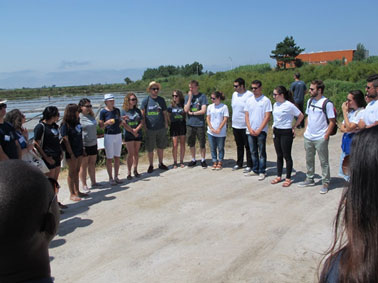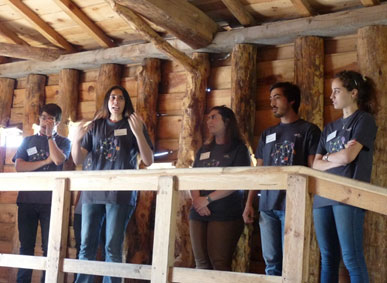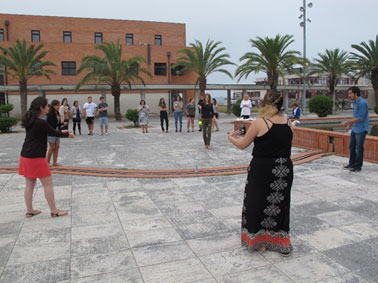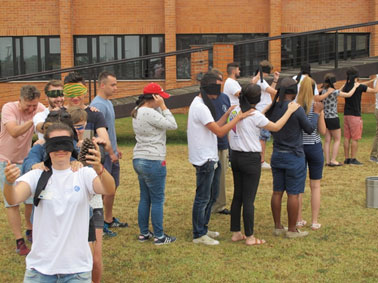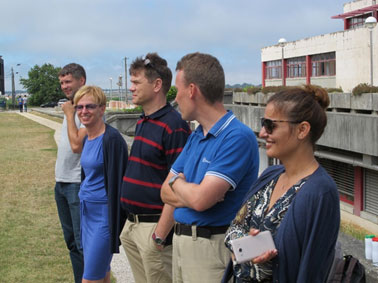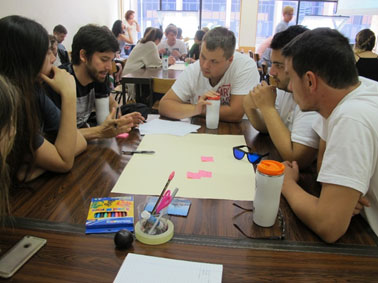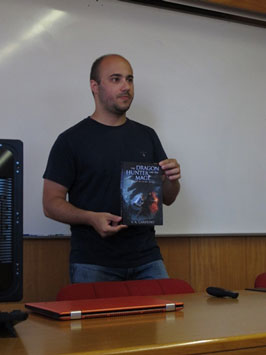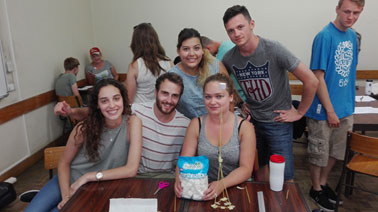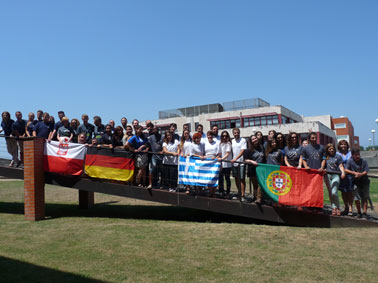During the last two weeks of July, six students from our University participated in a summer school in the beautiful Portuguese town of Aveiro located on the Atlantic Ocean.
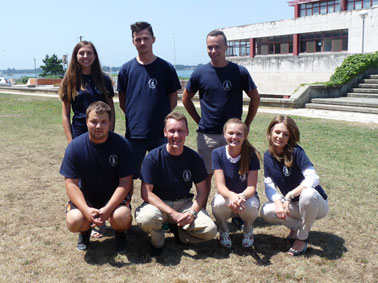
It’s a well-known resort described as “Portuguese Venice” due to a network of channels with gondolas sailing on them as well as picturesque tenement houses with characteristic tiled facades. Within 10 minutes, one can get to sandy beaches, which change their width depending on the tide. All this with a lighthouse in the background… Yet, let us start from the very beginning.
The summer school was organised as a part of the MELES (More Entrepreneurial Life at European Schools) programme financed from the ERASMUS+ programme. The main objective of the project is development of a programme for teaching entrepreneurship for multidisciplinary groups of students. It is worth emphasising that the Maritime University of Szczecin is the leader of the consortium carrying out the project, which includes: University of Aveiro (Portugal), University of Leipzig (Germany), University of the Aegean (Greece) and Bialystok University of Technology. The head of the project is Piotr Wołejsza, PhD, Eng. from the Faculty of Navigation, who is supported by Bogusz Wiśnicki, PhD, Eng. from the Faculty of Economics and Transport Engineering. The project will be carried out for 3 years, until 2017, and provides for organisation of two summer schools for students, the first of which was organised in July 2015 on the Greek Island of Chios.
Students from the Maritime University of Szczecin were recruited in March and the process involved a test in English (the required minimum level B1) as well as an interview during which students presented their ideas for a business. Six lucky students were selected from among the candidates, i.e. Aleksandra Kuchta (Faculty of Economics and Transport Engineering), Justyna Romej (Faculty of Economics and Transport Engineering), Elwira Kałkowska (Faculty of Marine Engineering), Michał Jezik (Faculty of Economics and Transport Engineering), Erik Kulbiej (Faculty of Navigation) and Michał Szczygło (Faculty of Navigation).
The students together with their supervisors, Bogusz Wiśnicki, PhD, Eng. and Piotr Wołejsza, PhD, Eng. stayed in Aveiro in the period 17-31 July 2016. The flight and accommodation at the University of Aveiro as well as modest pocket money were financed from the budget of the ERASMUS+ programme. The most important thing was the benefits from participation in the activities together with students from the universities creating the consortium of the MELES project. In general, there were 32 students in the programme from 11 countries: Portugal, Germany, Poland, Greece, Turkey, Columbia, Palestine, Mexico, Ecuador, Chile and Guatemala. The principle of the activities was work in 5-person international groups focused around their own business ideas. Each member of the group represented a different University and they communicated in English.
The programme was divided into three thematic blocks: Group Cooperation, Entrepreneurship and Innovation, which were provided, as a whole, by lecturers from the University of Aveiro and the Maritime University of Szczecin.
The opening ceremony of the summer school was held with participation of the Vice Rector and the Director of the Faculty of Mathematics of the University of Aveiro. The data concerning the host university was really impressive. There are 12000 students in Aveiro studying at 21 faculties and the university is among the best ones in Europe. After the welcoming ceremony, everyone went outside to the nearby salt fields. Such characteristic salt marshes stretch around Aveiro which, until this day, is famous for traditional production of salt from ocean waters. In such scenery, the students dressed in T-shirts with logos of their universities participated in games aiming at quick crossing of barriers and getting acquainted with each other. Later, everyone presented their business idea so that the best ones could be chosen on which the respectively selected projects groups would be working.
On subsequent days, the students created their projects groups and learned to cooperate effectively. The subjects of Teambuilding and Leadership were, to a large extent, done in the form of joint activities, some of which took part outside on the university campus. A lot of emotions and laughter were involved in the “Focus ring” and “Snake” activities, which taught the students how to communicate in a group and enabled selection of people with leadership personality.
Later on, students had an opportunity to get acquainted with tools and models that enable analysis of business projects. The lecturers devoted a lot of time to discussing the Canvas Business Model, which was then used by the project teams. The model enabled detailed analysis of the identified areas of business activity and mutual connections between these areas. The team work was supported by the teachers who acted as mentors.
An interval from team work was meetings with Portuguese entrepreneurs and creative people invited by the hosts. One of them was Vasco Cardoso – a fantasy writer. He told the students about the beginnings of his work and the difficulties in entering the book market. They received valuable clues which enable overcoming of obstacles faced by beginning artists. Everyone was fascinated with the huge determination the writer demonstrated to achieve the aim measured in intellectual and material values.
The competition between the project teams was exciting. It was visible in their work and business ideas as well as in competing during games and activities. Everyone is bound to remember the game developing group creativity called “Marshmallow Challenge”, the aim of which was to build the highest construction made of spaghetti, masking tape and string. The winner was the team of the student from the Faculty of Navigation, Erik Kulbiej. The tower built by them was 61 cm high.
Finally, the last day of the summer school came when the teams presented the effects of their two-week work with business ideas. All the audience, including the invited guests representing the world of business, were able to ask questions and then vote for the best presentation. The winner was the team with “Green Chain” presentation promoting the commercial use of biogas in Greece. The winning team included two students from MUS: Aleksandra Kuchta and Elwira Kałkowska.
At the end, the students with their teachers went to the beach where they spent the rest of the day and … night. Wind from the ocean, huge waves, local wine and the group of good friends from 11 countries. Até à vista Aveiro! Obrigado ERASMUS+.

